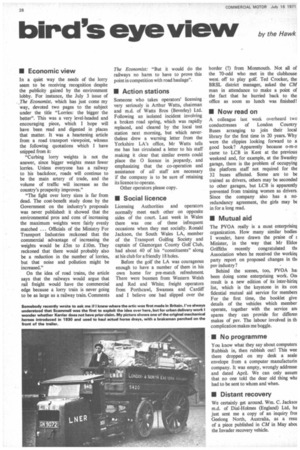bird's eye view by the Hawk • Economic view
Page 30

If you've noticed an error in this article please click here to report it so we can fix it.
In a quiet way the needs of the lorry seem to be receiving recognition despite the publicity gained by the environment lobby. For instance, the July 3 issue of The Economist, which has just come my way, devoted two pages to the subject under the title "Lorries: the bigger the better". This was a very level-headed and encouraging piece, which I hope will have been read and digested in places that matter. It was a heartening article from a road transport viewpoint, witness the following quotations which I have snipped from it: "Curbing lorry weights is not the answer, since bigger weights mean fewer lorries. Unless everyone has a railway to his backdoor, roads will continue to be the main artery of trade, and the volume of traffic will increase as the country's prosperity improves."
"The fight over lorry sizes is far from dead. The cost-benefit study done by the Government on the industry's proposals was never published: it showed that the environmental pros and cons of increasing the maximum weights were fairly evenly matched ... Officials of the Ministry For Transport Industries reckoned that the commercial advantage of increasing the weights would be £.5m to £10m. They reckoned that there would probably also be a reduction in the number of lorries, but that noise and pollution might be increased."
On the idea of road trains, the article says that the railways would argue that rail freight would have the commercial edge because a lorry train is never going to be as large as a railway train. Comments The Economist: "But it would do the railways no harm to have to prove this point in competition with road haulage".
• Action stations
Someone who takes operators' licensing very seriously is Arthur Watts, chairman and m.d. of Watts Bros (Beverley) Ltd. Following an isolated incident involving a broken road spring, which was rapidly replaced, and cleared by the local test station next morning, but which nevertheless drew a warning letter from the Yorkshire LA's office, Mr Watts tells me has has circulated a letter to his staff making it clear that similar events could place the 0 licence in jeopardy, and emphasizing that the co-operation and assistance of all staff are necessary if the company is to be sure of retaining its licence to operate.
Other operators please copy.
• Social licence
Licensing Authorities and operators normally meet each other on opposite sides of the court. Last week in Wales there was one of these infrequent occasions when they met socially. Ronald Jackson, the South Wales LA, member of the Transport Golfing Society and captain of Glamorgan County Golf Club, had about 40 of his "constituents" along at his club for a friendly 18 holes.
Before the golf the LA was courageous enough to have a number of them in his own home for pre-match refreshment There were busmen from Western Welsh and Red and White; freight operators from Porthcawl, Swansea and Cardiff and I believe one had slipped over the border (?) from Monmouth. Not all of the 70-odd who met in the clubhouse went. off to play golf. Ted Crocker, the I3RSL district manager, asked the CM man in attendance to make a point of the fact that he hurried back to the office as soon as lunch was finished!
• Now read on A colleague last week overheard two conductresses of London Country Buses arranging to join their local library for the first time in 20 years. Why were the clippies looking forward to a good book? Apparently because o-m-o came to LCB in Kent at the previous weekend and, for example, at the Swanley garage, there is the problem of occupying the platform staff not required for the 32 buses affected. Some are to be trained as drivers, others may be seconded to other garages, but LCB is apparently prevented from training women as drivers. Since the company also has a noredundancy agreement, the girls may be in for a long read.
• Mutual aid
The PVOA really is a most enterprisin organization. How many similar bodies I wonder, have drawn the praise of a Minister, in the way that Mr Eldor Griffiths recently congratulated th( Association when he received the workim party report on proposed changes in du psv industry ? • Behind the scenes, too, PVOA ha been doing some enterprising work. On result is a new edition of its inter-hirini list, which is the keystone in its con fidential mutual aid service for members For the first time, the booklet give details of the vehicles which member operate, together with the service ant spares they can provide for differen makes of psv. The labour involved in th complication makes me boggle.
• No programme
You know what they say about computers Rubbish in, then rubbish out! This wee there dropped on my desk a scale envelope from a computer manufacturin company. It was empty, wrongly addresse and dated April. We can only assum that no one told the dear old thing wha had to be sent to whom and when.
• Distant recovery
We certainly get around. Wm. C. Jacksoi m.d. of Dial-Holmes (England) Ltd, ha just sent me a copy of an inquiry frot Geelong North, Australia, as a resu of a piece published in CM in May abot the Invader recovery vehicle.




























































































